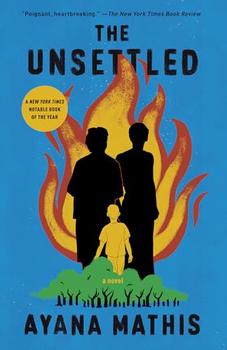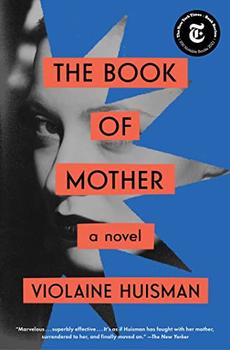Summary | Excerpt | Reading Guide | Reviews | Beyond the book | Read-Alikes | Genres & Themes | Author Bio

It's no surprise that Avni Doshi's debut novel was shortlisted for the 2020 Booker Prize. Her prose is crisp, clean and brutal from the opening line: "I would be lying if I said my mother's misery has never given me pleasure." In Burnt Sugar, Doshi depicts the relationship between Antara and her mother, Tara, over three decades.
The book is narrated by Antara once she has grown up and Tara has begun to show signs of dementia. It includes flashbacks of Tara's youth and Antara's childhood in Pune, India. As a young woman, Tara is headstrong and rebellious, putting her own needs ahead of those of her daughter. She turns her back on the comfortable life led by her affluent husband and parents to join an ashram, uprooting her infant child and dragging her into a chaotic and abusive existence during her formative years.
As an adult, Antara has adopted many of the conventional comforts that Tara rejected. She and her American-born husband Dilip belong to a private members club and attend dinner parties at the homes of their well-off friends. Tara critiques her daughter's lifestyle and career as an artist, her criticism growing more cutting as her dementia worsens and her lucidity wanes. Meanwhile, Antara grapples with the logistical and emotional hurdles of caring for her mother. The foundations of their relationship are deeply fractured as existing cracks begin to open into chasms that threaten to pull them both in.
Doshi's artful depictions of memory demonstrate how Antara is haunted by an undercurrent of trauma that remains from her turbulent, and sometimes violent, upbringing. Her heartbreaking accounts include her mother's neglect of her as a small child, a stint of being homeless and begging on the street, and a later period of attending a strict Catholic boarding school. Her impressions paint a picture of life in the ashram that is vivid and disturbing in its simultaneous innocence and instability, showing her exposure at a young age to what is referred to as a free love lifestyle and sensual hedonism. While Doshi never directly states this, the community of the ashram resembles a movement led by Bhagwan Shree Rajneesh, which originated in Pune (see Beyond the Book).
In the ashram, Antara is taken under the wing of an American devotee known as Kali Mata, who serves as an affectionate maternal figure. In her role as a substitute mother, Kali Mata does not entirely replace Tara, and it becomes clear that she is filling the emotional void left by her own deceased children through her relationship with Antara. However, the two maintain a connection even after Antara leaves the ashram with her mother. Antara's recollections of Kali Mata, who has passed away by the time the book opens, show that parental care and affection can be given by people other than actual parents.
At the core of the novel is a juxtaposition of care. Tara's neglect of Antara is apparent in her emotional, and often physical, absence. Later, Antara is faced with caring for Tara, a responsibility the older woman eschewed undertaking for her. The relationship between the two is cloaked in the illusions and perceptions they each have about what they owe to one another. When Tara's dementia threatens her physical safety, Antara experiments with bringing her mother into her own home. This forces her to lift the veil on the carefully balanced pretenses she has been living with:
She doesn't say more, but I sense she is thinking, I won't be here for long. We haven't discussed whether this is a trial run for an impending event or an adult slumber party, and I think it might be better that both of us continue with our separate illusions. But when the small canvas bag she has brought with her gapes open and we discover that she has forgotten her toothbrush, medicine, underwear and nightgown, I realize that one of us at least must be clear-headed and perhaps the time for my illusions is past.
For those who are mothers, or are contemplating the idea of motherhood, Burnt Sugar may dredge up insecurities, guilt and shortcomings. Antara's own insecurities appear throughout the book and include her concern that she, too, will be unable to control her impulses, and that she will parent as poorly as her mother. While disquieting, however, the novel is surprisingly light in parts, with Doshi infusing wry humor at well-timed moments in her depiction of the nuances of the mother-daughter relationship. At one point, it becomes clear that Tara is aware of her daughter's fears after a doctor's visit for which Antara has diligently studied information about dementia in order to have a detailed discussion with her mother's physician. Tara chastises Antara for her focus:
She taps my hand and points to the notebook. 'You should worry about your own madness instead of mine.'
While deeply feminine in its complexities, Burnt Sugar will touch anybody who has experienced a parental bond. It will make readers contemplate their own parental relationships, or lack thereof, and quietly celebrate that maternal figures come in many different forms.
![]() This review was originally published in The BookBrowse Review in March 2021, and has been updated for the
March 2022 edition.
Click here to go to this issue.
This review was originally published in The BookBrowse Review in March 2021, and has been updated for the
March 2022 edition.
Click here to go to this issue.

If you liked Burnt Sugar, try these:

by Ayana Mathis
Published 2024
From the best-selling author of The Twelve Tribes of Hattie, a searing multi-generational novel—set in the 1980s in racially and politically turbulent Philadelphia and in the tiny town of Bonaparte, Alabama—about a mother fighting for her sanity and survival.

by Violaine Huisman
Published 2022
A gorgeous, critically acclaimed debut novel about a young woman coming of age with a dazzling yet damaged mother who lived and loved in extremes.
Your guide toexceptional books
BookBrowse seeks out and recommends the best in contemporary fiction and nonfiction—books that not only engage and entertain but also deepen our understanding of ourselves and the world around us.